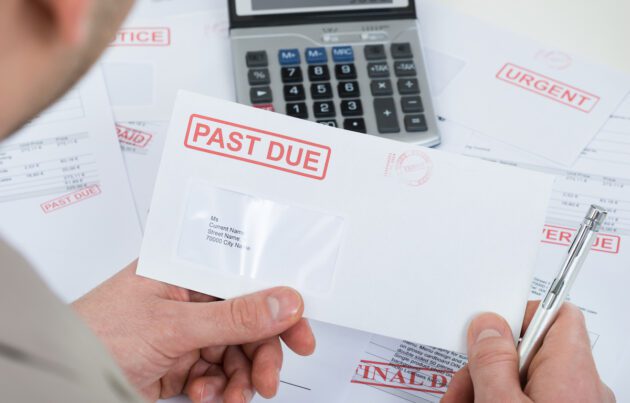How To Write a Past Due Rent Notice
If you're a landlord, chances are you've had to deal with tenants who pay rent late. Sometimes, late rent is an accident. Maybe they pay rent late because they were traveling at the end of the month and forgot. Maybe they pay monthly rent on time, but the check seems to always get lost in the mail.

It really doesn't matter what the circumstances are. A tenant signs a lease agreement as a promise that they'll make timely payments. There's no excuse for you to have to struggle, as a landlord, when it comes to collecting rent.
Receiving rent payments late is unacceptable, and not something you have to stand for. If you have a delinquent tenant, make sure they pay up. Send out a past due rent notice.
What is a late rent notice?
A past due rent notice is the first step in addressing overdue rent in your rental property. You're sending a written notice that reminds tenants that they aren't paying rent on time, and they need to pay overdue rent immediately to avoid penalties.
Include information on penalties in your lease agreement
This is the basic message of your late rent notice. It's a very straightforward notice to pay. However, you can also use this letter to remind your tenant what will happen if they don't pay, or continue to pay late rent. These consequences should all be outlined in the lease agreement, but a little reminder doesn't hurt.
Using words like 'eviction proceedings' or 'pay or quit the property' can really motivate a tenant to pay. You may even want to cite a few local laws just to prove you're in the right if you take legal action.
When should you send a late rent notice?
Ideally, you should send a past due rent notice as soon as the rent is late. This way, the tenant is aware that they need to take action in order to avoid any penalties. Most likely, you worked in a tiny grace period in your lease agreement so a tenant will still have time to pay rent if they act fast.
To ensure delivery, it's a good idea to send your notice to pay via certified mail. You'll get a delivery receipt. It's also worthwhile to send a second copy digitally via email. You want to make sure there's no way your tenant misses this notice to pay rent.

What should you include in a late rent notice template?
When writing a late rent notice, it's best to have a template already designed. This way, you won't forget vital information and will sound professional enough to hopefully see that late rent payment come in quickly. Be sure to include the following information:
- Tenant's name and the rental property address
- Amount of past rent due
- Date the past due rent is due
- Whether or not you'll accept partial rent payments
- Any late fees you'll apply
- Date you sent the notice
- Consequences for continual late payments/not paying the delinquent rent
- Your signature and contact information
If you accept a partial rent payment make sure to specify the deadline you expect the tenant to have paid you back fully.
Since this is a tenant's reminder to pay rent, you don't want to get too mean in your wording. They may have simply forgotten, or are dealing with extenuating circumstances they didn't mention to you. This notice to pay rent may clear everything up, seeing you get your check with a huge apology from your tenant. That's the hope, anyway.
There will be that rare case, though, when this letter doesn't do the trick. If reminding tenants they need to take action in order to avoid any penalties falls on deaf ears, then it might be time to send an eviction notice or pay or quit notice.
How can I prevent late rent payments?
Since late payments are such a hassle for both the property manager and the tenant, there are a few things you can do as a landlord to ensure rent payments come in on time.
- Include a late fee in the rental agreement. This will serve as a reminder to the tenant that they'll be charged a penalty if they don't pay their rent within a certain number of days after it's due.
- Use an online rent collection service and request tenants set up automatic payments. This ensures rent gets automatically deducted from the tenant's bank account on the due date.
- Offer a discount for early payment. This can incentivize tenants to pay their rent well before it's due.
- Schedule automatic reminders. Maybe you set up a monthly meeting with your tenants that's really just an entry in their calendar to pay rent, or you have an email blast that goes out once a month, a few days before the rent is due. This is a little extra work on your part, but it saves you from tracking and following up with late rent issues.
By taking these steps, landlords can help to prevent late rent payments and avoid being in a position where you're constantly making a rent demand on your tenants.

Calculating a late fee amount?
When it comes to past due rent, landlords may want to consider charging a late fee. This is a penalty that's charged to the tenant for not paying their rent on time. You can charge a percentage of the rent as a late fee, a flat fee or a daily fee until the rent gets paid.
No matter how you calculate it, include the late fee in the rental agreement so that the tenant is aware of the penalty they will face, from the start, if they don't pay their rent on time.
To calculate a late fee, landlords can use one of two simple formulas:
- Late fee = (daily fee x number of days past due)
- Late fee = (percentage of rent x past due rent amount)
Let's say a month's rent is $500.
If the rental agreement states that the late fee is $5 per day, and your tenant is 10 days late already, the late fee would be $50. Adding that to the rent owed, the total price would be $550.
If the rental agreement states that the late fee is 10 percent of the total amount of rent owed, and the tenant only owed one month, the late fee would be $50. Adding that to one month's late rent, the tenant would owe $550.
If you simply charge a flat rate for late rent, make sure it's high enough to send a message. Anywhere between $50-$100 typically resonates with tenants.
No matter what, before you charge a fee for late rent, make sure state laws say you can, and check to see if they cap the amount. Then, decide what fee structure is appropriate and right for you. Don't feel guilty about charging a fee, either. You have financial obligations related to the property, too, and not paying rent is a lease violation worthy of a consequence.
Adding in a little wiggle room to your late rent letter
Even though you want — and deserve — your money, it's OK to not be overly harsh on your tenants. You can ease them into paying by offering a few little compromises when you send your late notice. You'll still get the money you're owed, and showing a little compassion can go a long way.
Consider a grace period
Even as you demand payment, consider offering a 10-day grace period to take some pressure off your tenant if they've run into a real issue. This would mean that if rent is due on the 1st of the month, the tenant has until the 11th to pay the rent without being charged a late fee.
There's no grace beyond the grace period, though. If the tenant pays the rent on the 12th, they'll also owe the additional fee.
Accept partial payments
If the tenant is unable to pay the full amount of past-due rent and comes to you asking if they can pay it off in installments, you may want to consider accepting partial payment. Establish a payment plan with your tenant, complete with a final due date to catch up on past rent. Put the agreement in writing, and have both parties sign, so that there's no confusion later.

What if a tenant continues to pay rent late?
If a tenant continues to pay rent late, landlords may want to consider taking legal action. This could involve evicting the tenant or taking them to court.
How much leeway you give them before filing an eviction lawsuit or hiring a law firm to help you deal with this problem is up to you. If you're dealing with rent failure on a more regular scale, it's sometimes best to take back the rental property, cut your losses and find prospective tenants who you feel confident will make their rent payment on time.
Sticking to the terms of your lease agreement
A tenant should never feel like they're getting a past due rent notice out of the blue. First, they'll know their rent is late because you've established a set due date. Second, you've spelled out this whole process in the lease, which your tenant should have read when they signed it.
This rent is yours, it's owed to you, so don't let rent payments dally. Stay on top of rent each month, and send out a past due rent notice as soon as you can.
